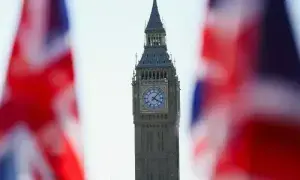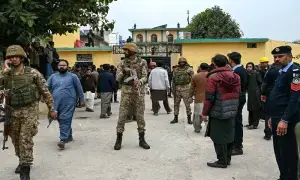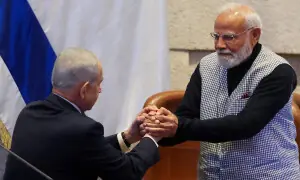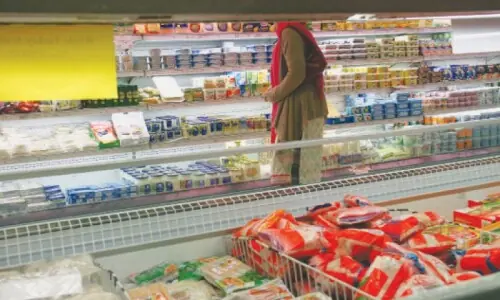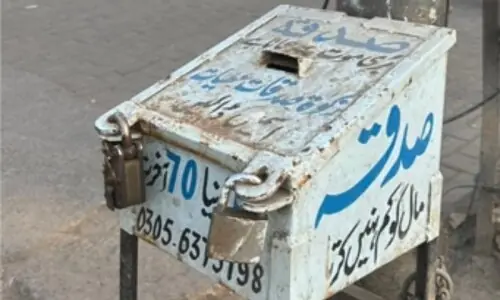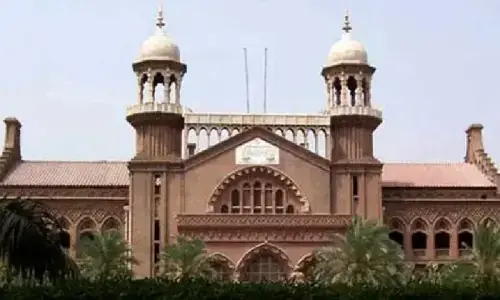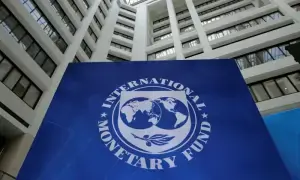The Islamabad High Court (IHC) on Friday inquired why Baloch protesters in the federal capital, who were subjected to brutal police action a day earlier, were being “forcefully” sent back to their province.
“They can stay in Islamabad, protest or go back home. The choice is theirs,” remarked IHC Chief Justice Aamer Farooq on a petition filed by Baloch protesters against unlawful detention.
On Wednesday night, the Islamabad police used brutal force to disperse and detain Baloch demonstrators who had converged on the capital to protest against enforced disappearances and extra-judicial killings in their province. More than 200 protesters were taken into custody from different areas of Islamabad. The demonstrators were also met with tear gas, water canons and police batons.
The events were strongly condemned by human rights organisations, politicians and analysts. Later on Thursday evening, the government said 90 per cent of the Baloch men and women taken into custody had been released, except for the men who “could not be identified” by police.
However, while hearing a petition seeking the release of detained Baloch protesters, the IHC was told that more than 50 Baloch women protesters “went missing” on Wednesday night, following the police action.
The court had subsequently asked the representatives of the protesters and their counsel to approach the Islamabad SSP (Investigation) to record their version and sought a report from the police today.
The written order issued after the hearing, a copy of which is available with Dawn.com, said that it was “only appropriate that police authorities inform the petitioners and their counsels about address of the destinations, where women have been taken and once this is done, persons held responsible, be accounted for. Likewise, details of the women, who have gone back on their own, be also shared with the petitioners.”
The order said the case would now be taken up on December 27.
The hearing
During the hearing today, the petitioners’ counsel Attaullah Kundi and Imaan Mazari appeared before the court.
At the outset, Kundi contended that the police had told the counsels that a bus was waiting outside the police station which would take the protesters back home. “We had a conversation over this with the police for three hours,” he said.
The lawyer further stated that the SP had told them that orders were issued by the prime minister for the repatriation of the protesters. “Baloch women were forcefully filled into buses,” he revealed, adding that some Baloch students studying in Islamabad were also forced into the buses.
However, later these students were released, Kundi said. “Seeing all this, the drivers of the buses refused to move. During all this, the Islamabad police chief reached the police station and said these people should be sent back anyhow,” he told the court, adding that the gates of the police station were later closed.
At 5am, the police issued a statement that protesters had been safely sent back home, the lawyer pointed out.
At that, the court inquired who had appeared in court to represent the police to which a police officer came forth. However, Justice Farooq expressed displeasure and summoned IG Akbar Nasir in half an hour.
Appearing before the court, the police chief said he had arranged for the transport of the protesters.
“Wait a moment … where did you take them? Why did you send them? They could have stayed in Islamabad wherever they wanted to,” the judge stressed. “Whether they stay in Islamabad, protest or go home. It is their choice,” he remarked.
Justice Farooq further inquired where the detained protesters were staying, to which the IG replied the arrested women were staying at a hostel in I-10 sector.
“Tell the counsels where they are,” the court instructed the police chief.
Here, Kundi pointed out that the IG had miscommunicated in court yesterday that there were no women in police custody and demanded that contempt proceedings be initiated against him.
For his part, the police chief claimed the detained women protesters were provided with transport facilities to go wherever they wanted to.
When asked how many protesters were in police custody, the IG replied that 216 Baloch men and women were at the Kohsar police station of which some had been sent on judicial remand. Out of these, 19 women were released, he added.
Protesters at the Tarnol police station were released by the local magistrate while 162 detainees were sent on judicial remand, said IG Nasir.
The court also asked about the number of women who were sent home, those released and the ones staying at the hostel. It also directed the police chief to arrange a meeting of the women with their counsels.
“You have to convince them that not one person is missing,” Justice Farooq emphasised.
At one point during the hearing, journalist Hamid Mir appeared in court. He said that during a press conference yesterday, a trio of caretaker ministers — Fawad Hassan Fawad, Murtaza Solangi, and Jamal Nasir — had said all the protesters were released.
“But we found out that none of them were released. I went to the police station to check myself,” he said. “Women and children were being forcefully dragged and pushed into buses outside the Women Police Station.”
Mir said he had also reached out to Fawad over the matter. “A little girl came to me and kept saying she didn’t want to go back,” he recalled. “But when I reached out to the police, they cursed at me and snatched my mobile phone,” the journalist said.
Meanwhile, Ahmed Butt of the Human Rights Commission of Pakistan said the women were being filled into buses “like sheep” and highlighted that protests were a constitutional right of every person in a democracy.
“The treatment meted out to our children and women in the past few days has never been seen in history,” he said. “Whoever did this should be punished.”
On the other hand, the court inquired why a press conference was held by three ministers, to which the police chief replied that the government had formed a three-member cabinet committee to negotiate with the protesters.
“So if a committee was formed what was the need to hit them or forcefully send them home?” Justice Farooq asked. “They came here for a protest and you are forcefully sending them home. Why?”
The IHC CJ further expressed displeasure over Wednesday night’s events, regretting the police action on protesters. “What kind of a society are we living in? Even if a common person is being unjust, public officeholders should always be careful,” he remarked.
The court then instructed Kundi to oversee the entire matter and contact the IHC registrar office if there was a problem. It further said that all the women staying at the I-10 hostel be released.
“I will issue a detailed order of today’s proceedings,” Justice Farooq said, adding that the next hearing would be conducted by Justice Miangul Hasan Aurangzeb.





